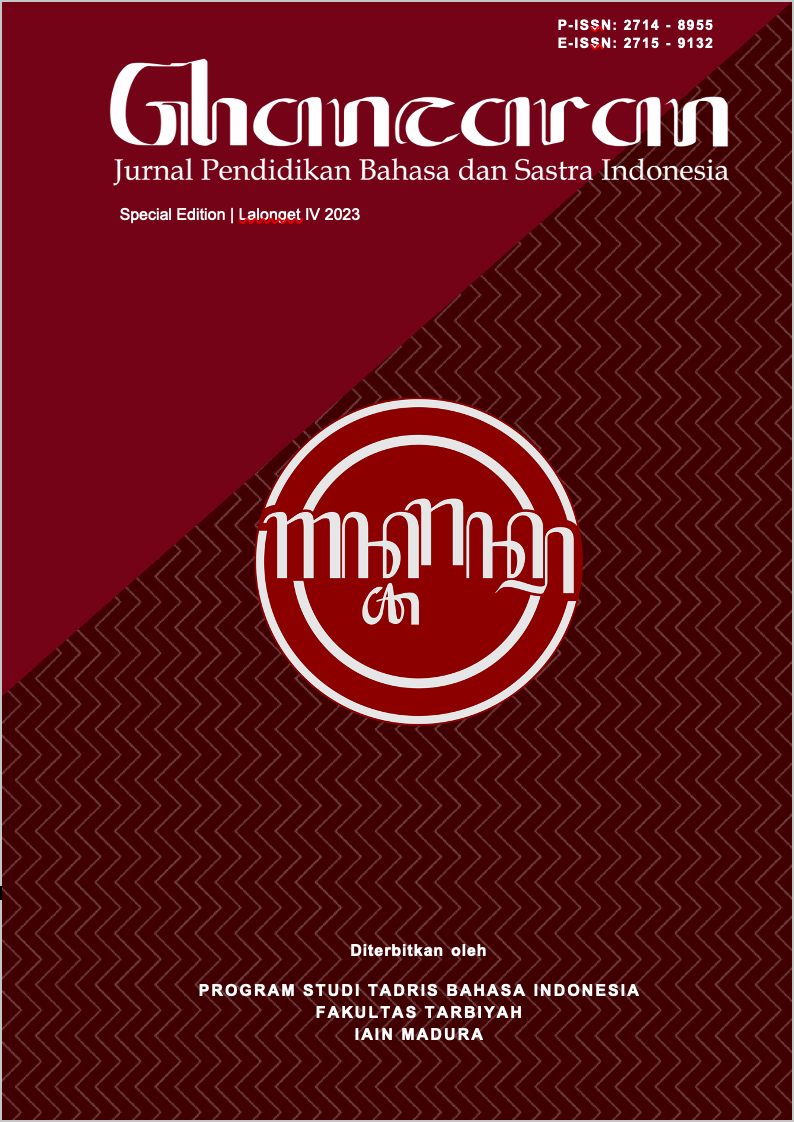Etika Lingkungan Sastra Digital Madura serta Pemanfaatannya dalam Pembelajaran
 Abstract views: 285
,
Abstract views: 285
,
 PDF downloads: 284
PDF downloads: 284
Abstract
The relationship between nature and literary works has given birth to a concept regarding ecological issues in literature. Ecocriticism depicts the connection between humans and the environment in all cultural aspects, and it can even address ecological issues. The purpose of this research is to examine the environmental ethics values found in the short story collection 'Rokat Tase' by Muna Masyari and how they can be utilized in Indonesian language learning. This study is a qualitative descriptive research with quotation data from the short story texts containing environmental elements. The data analysis technique used is the ecocritical analysis approach with an ethical study model. The research steps consist of data collection, data reduction, presenting data, and drawing conclusions. The research results show that there are 5 environmental ethics values, namely respect for nature, cosmic solidarity, the principle of compassion and concern for nature, the principle of non-harm, and the principle of simple living in harmony with nature. As per the objectives of literature learning in the 10th-grade Merdeka curriculum, where students are expected to connect and appreciate the values contained in literary works, the values found in the short stories by Muna Masyari can be utilized as important teaching materials to address the environmental issues faced by humanity.
Downloads
References
Artika, I. Wayan. 2016. Sastra Dan Kenyataan. Denpasar: Pustaka Larasan.
Endraswara, Suwardi. 2016. Sastra Ekologis Teori Dan Praktik Pengkajian. Yogyakarta: CAPS.
Garrard, Greg. 2004. Ecocriticism. New York: Routledge.
Glotfelty, Cheryll, and Fromm Harold. 1996. The Ecocricism Reader: Landmarks in Literary Ecology. London: University of Georgia Press.
Juanda. 2019. “Ekokritik Film Avatar Karya James Cameron Sarana Pendidikan Lingkungan Siswa.” Jurnal Pendidikan Bahasa Dan Sastra Indonesia (Vol.8 No.1).
Miles, Matthew B., and A. Michael Huberman. 2005. Qualitative Data Analysis. Jakarta: UI Press.
Oktafia, Sindi, and Encil Puspitoningrum. 2022. “Analisis Ekokritik Pada Novel Tentang Kita Karya Wiwik Waluyo Untuk Pembelajaran Sastra Di Sma.” Prosiding SEMDIKJAR (Seminar Nasional Pendidikan Dan Pembelajaran) 5:616–48.
Putikadyanto, A. P. A., Efendi, A. N., Romadhon, S., Amin, M. B., & Sefrianah, N. A. (2021). Persepsi Siswa terhadap Pembelajaran Bahasa Indonesia Berbasis Daring di SMAN 1 Pasuruan. GHANCARAN: Jurnal Pendidikan Bahasa dan Sastra Indonesia, 104-116.
Putikadyanto, A. P. A., Zamahsari, G. K., & Thoha, M. (2022, November). A Bibliometric Analysis of Digital Game-Based Language Learning to Support Future Language Learning. In Proceedings of the 7th International Conference on Sustainable Information Engineering and Technology (pp. 207-211).
Rahman, Hasrul. 2021. “Pastoral Literature; As an Effort to Form An Environmental Love Character.” Sebasa: Jurnal Pendidikan Bahasa dan Sastra Indonesia (Vol. 4 No.1):45–52.
Saguni, Suarni Syam. 2019. “Representasi Kerusakan Lingkungan di Indonesia dalam Puisi Media Daring Indonesia (Kajian Ekokritik).” Jurnal Sutiyani. doi:
Solihati, Nani. 2014. “Penyimpangan Bahasa Puisi dalam Sastra Siber.” Jurnal Pendidikan Bahasa dan Sastra (1):40–49. doi: DOI: https://doi.org/10.21009/BAHTERA.131.5.
Wahyudi, Ilham, and Noni Adriyani. 2023. “Prinsip Etika Lingkungan Hidup Dalam Novel Serdadu Pantai Karya Laode Insan.” SAJAK: Jurnal Penelitiandan Pengabdian Sastra,Bahasa,Dan Pendidikan (Vol.2 No.1).
Winkel, W. S. 2009. Psikologi Pengajaran. Yogyakarta: Media Abadi.
Yasa, I. Nyoman. 2012. Teori Sastra Dan Penerapannya. Bandung: Karya Putra Darwati.
Zulfa, Afriya Naili. 2021. “Teori Ekokritik Sastra: Kajian Terhadap Kemunculan Pendekatan Ekologi Sastra yang Dipelopori Oleh Cheryll Glotfelty.” Lakon : Jurnal Kajian Sastra dan Budaya 10(1):50.
Copyright (c) 2023 GHANCARAN: Jurnal Pendidikan Bahasa dan Sastra Indonesia

This work is licensed under a Creative Commons Attribution-ShareAlike 4.0 International License.
Ghancaran: Jurnal Pendidikan Bahasa dan Sastra Indonesia uses an Open Access Policy under the Creative Commons Attribution-ShareAlike 4.0 International License. Authors publishing in this journal agree to the following terms:
- Ghancaran Journal holds the copyright and grants the journal rights for first publication with the work simultaneously licensed under a

The work is distributed under Creative Commons Attribution-ShareAlike 4.0 International License which allows others to share, copy, and redistribute the material in any media or format and adapt, remix, change, and develop the material even for commercial purposes, as long as it is stated credit and license derivative works under similar terms. - Authors may make additional contractual arrangements for non-exclusive distribution of the journal's published work version.
- Authors are permitted to post their work online (e.g., in institutional repositories or on their websites) before and during submission, as doing so may lead to productive exchange.



















